Evernote is a useful program for tracking information across multiple devices. It's a good way to quickly organize your life and make sure you always have access to the information you need. Read the steps below to learn how to install and start using Evernote.
Steps
Method 1 of 5: Installation
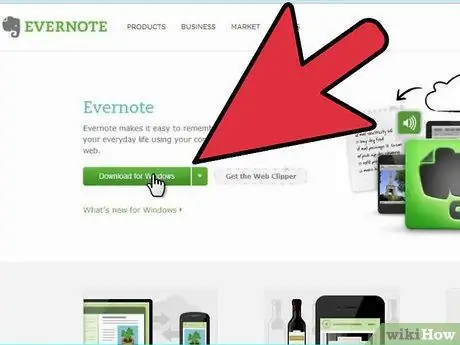
Step 1. Download the program
Visit the Evernote website at https://www.evernote.com and click on the green button that says "Download Evernote - it's free".
-
If you are using a mobile device, the Evernote application will install itself automatically; if you are on a computer, you will download the installer.
If you need to download a different version, select the green text that says "Get Evernote for mobile, tablet and other devices." A list of all versions of Evernote will appear. Choose the version you need
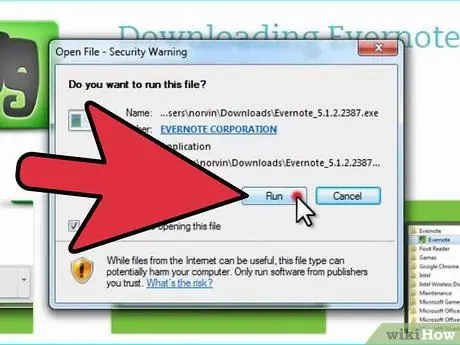
Step 2. Install the program
If you have downloaded Evernote on your pc, you will need to install it. Find the installation file and double-click the green Evernote icon.
- Accept the terms of use. Read them if you wish.
- Click the install button to complete the process.
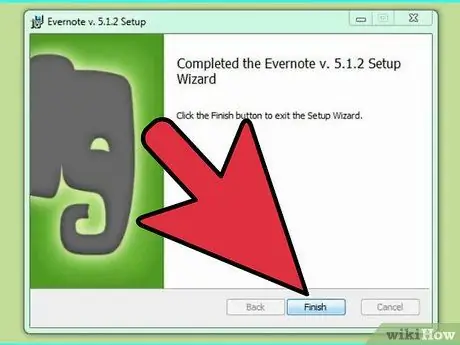
Step 3. Repeat the operation on all devices
One of Evernote's main features is its ability to access information stored on all of your devices. To make the most of this program, you'll need to install a copy of Evernote on each device you want to use.
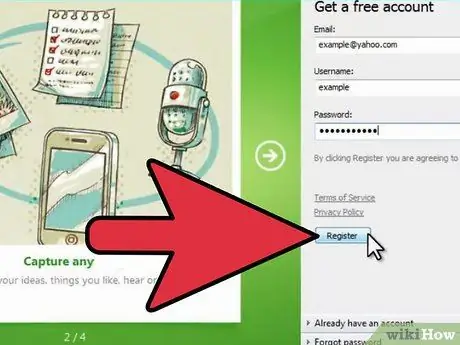
Step 4. Register an account
Open Evernote on your primary device or computer. You will see a sidebar on the right called New Evernote Users, which will ask you to enter some basic information to create an account. Complete the fields and click on the button to register.
If you have already registered, click on "I already have an account" in the lower right corner and enter your personal information
Method 2 of 5: Getting Started
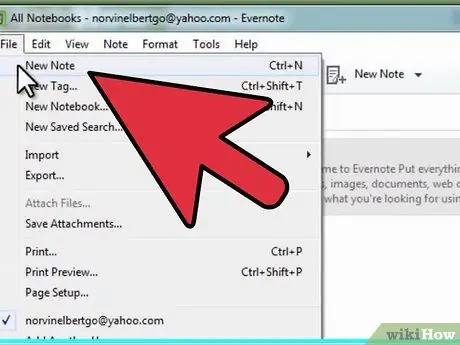
Step 1. Create a new note
Evernote stores information of each type in a single type of container called a "note". You can create a new note by clicking on the "New note" button in the upper right area of the window. When you've created a new note, you'll see it appear in the middle column as an untitled note, above the default Evernote welcome note. The content of the note appears in the right column. The note is made up of some distinct parts:
- In the upper part there is a field for the title; next to it you will find a drop-down menu that tells you which notebook the note is currently assigned to. (We will talk about notebooks in another passage.)
- Below the title field, there is a clickable text that reads "Click to set URL source…". This field is used in case you have copied information from an online source.
- Next to the URL, you will find a field to enter tags (keywords that can be searched for).
- Below the URL and tag fields, you will find a series of word processing controls that will allow you to format and change the font and size of the text.
- The lowest and main area of the note is the content field. At this moment it is empty.
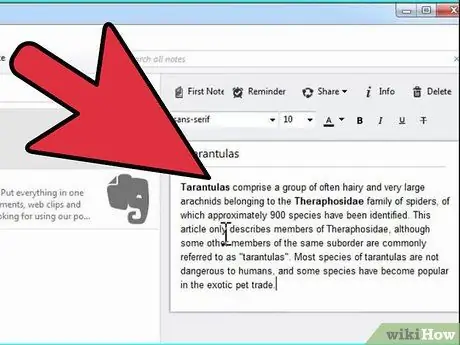
Step 2. Fill in a note
Enter information in the different fields to create a useful note. Evernote will save and update your note automatically as you fill it in.
-
Start by clicking on the title field and giving your note a name. This will help you find it more easily, so it's a good habit to follow before you have hundreds of notes.
If you don't want to enter a title, Evernote will consider the first part of the note text as the title
-
Navigate to the tag field and assign one to your note. Tags are another way to search for notes. They are usually related to the subject of the note.
- Unlike Twitter, you don't necessarily need to start your tag with a # symbol. You can do this if you prefer, of course.
- Try to use short, direct tags. For example, if you are doing geological research, you could assign the "geology" tag to all your research notes.
- You can add as many tags as you like.
Step 3. Click on the content field and enter some text
This will be the content of your note. For now, write what you prefer.
Method 3 of 5: Using the Tools and Features

Install and Use Evernote Step 7 Step 1. Add a text or PDF document
Drag a plain text or.rtf text document into your note, and you'll see it appear copied into it.
- If you add a PDF file, the file will appear in its own sub-window which provides simple controls for viewing.
- You can't add Word files without paying a fee to upgrade the program.

Install and Use Evernote Step 8 Step 2. Add the copied text
Highlight the text you want to add, then drag it onto the note. Simple!
By adding web addresses in this way, they will be automatically formatted as clickable links

Install and Use Evernote Step 9 Step 3. Add an image
Drag an image file to your note. It will appear in the note, resized for the window size.
- You can drag images to rearrange them.
- Animated images, such as-g.webp" />

Install and Use Evernote Step 10 Step 4. Add a music file
Most common music file formats, such as WMA and MP3 will appear inside a long box in your note.
You can play these files directly within Evernote by clicking the Play button on the left side of the box

Install and Use Evernote Step 11 Step 5. Add other files
In addition to the more common files described above, Evernote will show the files you add as large rectangular buttons. Try adding files of different types, such as saved web pages and WMV video clips, to see what the buttons look like.
If you click on the button, the file will open, if there is a program on the device that can open it. Evernote cannot open the file by itself

Install and Use Evernote Step 12 Step 6. Delete an object
It is useful to know how to get rid of the files inside the notes you want to delete. There are two simple ways to do this:
-
Right click on an object such as an image or button and choose "Cut" from the menu.
The objects you cut can be glued wherever you like. Place the cursor in the desired location and type Ctrl-V to paste
- Put the cursor right before what you want to delete, and hit the Delete button to delete it.
Method 4 of 5: Organize and Control Your Notes

Install and Use Evernote Step 13 Step 1. Sort your notes
Between your new note and the default welcome note, you should see two more notes in the middle column of the program. Above this column you will find a drop-down menu and a text field.
- To sort your notes by different parameters, use the drop-down menu. You can sort them by tag, title, and more. Experiment with these options.
-
To search for a note, enter some text in the field. Evernote will quickly go through your notes and display any that contain the text you typed.
Evernote can detect text printed on images as well, but this feature is still not very reliable

Install and Use Evernote Step 14 Step 2. Insert a note in a new notebook
THE notebook are collections of notes, sorted according to the criterion you prefer. You will find the list of notebooks in the left column.
-
Create a new notebook. Give it any name you like, and decide whether access will be extended to all devices or limited to only the one in use. The new notebook will appear in the list. You will not be able to change these parameters once you have created the notebook. You can do this in two ways:
- Right click on the top level "Notebooks" and select "Create notebook …" from the menu.
- Press the Insert button on your keyboard.
- Drag the note to the new notebook. To view it, click "All notebooks" or the notebook it was placed in in the left column. Drag the note from the middle column above your new notebook name to the left column.

Install and Use Evernote Step 15 Step 3. Search for your tags
In the left column, under your notebooks, you will find a pop-up menu called "Tags". Click on it to see all the tags you have added so far.
Click on a tag to view all the notes that report it in the central column

Install and Use Evernote Step 16 Step 4. Delete your notes
At the bottom of the left column you will find a waste basket. Click on it to see the notes you deleted.
- To restore a note you deleted by mistake, click on the note in the middle column, and then click "Restore" at the top of the right column.
- To permanently delete a note, click on it in the middle column, and click "Delete" at the top of the right column. You will be required to confirm your decision before Evernote permanently deletes the note.
Method 5 of 5: Using Other Notes

Install and Use Evernote Step 17 Step 1. Try other notes
Evernote offers you four different methods for creating notes. Depending on your device and current situation, some may be more useful than others.

Install and Use Evernote Step 18 Step 2. Write a note in ink
Click on the black triangle next to the "New Note" button at the top right of the window and choose "New Ink Note". You will see a light yellow note with blue lines printed on it.
Click and drag the cursor over the note to write. It is useful for devices with styluses or touch screens

Install and Use Evernote Step 19 Step 3. Make an audio note
Click on the black triangle next to the "New Note" button at the top right of the window and choose "New Audio Note". You will see a decibel indicator and a blue "Record" button.
- Click the button and speak to record an audio note that can be played later.
- Make sure the sound indicator is moving before recording. If not, your device's microphone may not work properly.

Install and Use Evernote Step 20 Step 4. Record a video note
Click on the black triangle next to the "New Note" button at the top right of the window and choose "New Video Note". You will see a square window showing video controls.
- Click "Record" to record a note with a webcam or phone camera.
- Click "Take a photo" to record a still image as a note.

Install and Use Evernote Step 21 Step 5. Synchronize your notes
When you've installed Evernote on two or more devices, you can easily sync your notes across each of them.
Click on the "Synchronize" button in the upper central part of the window

Install and Use Evernote Step 22 Step 6. Log in to Evernote on another device
Notes created with the first device will be visible.
When you are signed in to Evernote on a device, you will not normally be signed out, even if you quit the program. If you need to log out for some reason (eg you are using Evernote on a shared computer), click on File and choose "Exit" before closing the program

Install and Use Evernote Step 23 Step 7. Keep learning
With the information provided in this article, you will be able to use all the basic features of Evernote; however, there are many other shortcuts and features that you can discover. Visit the official site to read blogs and guides, or search the internet for other guides.
Advice
- While there is no way to get Evernote to recognize Word files without paying to upgrade your account, there is no such restriction for OpenOffice.org files. Open Office is a powerful and free software suite similar in many ways to Microsoft Office. It can also save files in.doc format. If you want to save money, install and use Open Office.
- The premium version of Evernote offers many benefits in addition to full compatibility with multiple formats. It allows you to sync all your work, collaborate with other users of the service, and upload up to 500MB to your account each month, compared to just 40MB for the free version.






